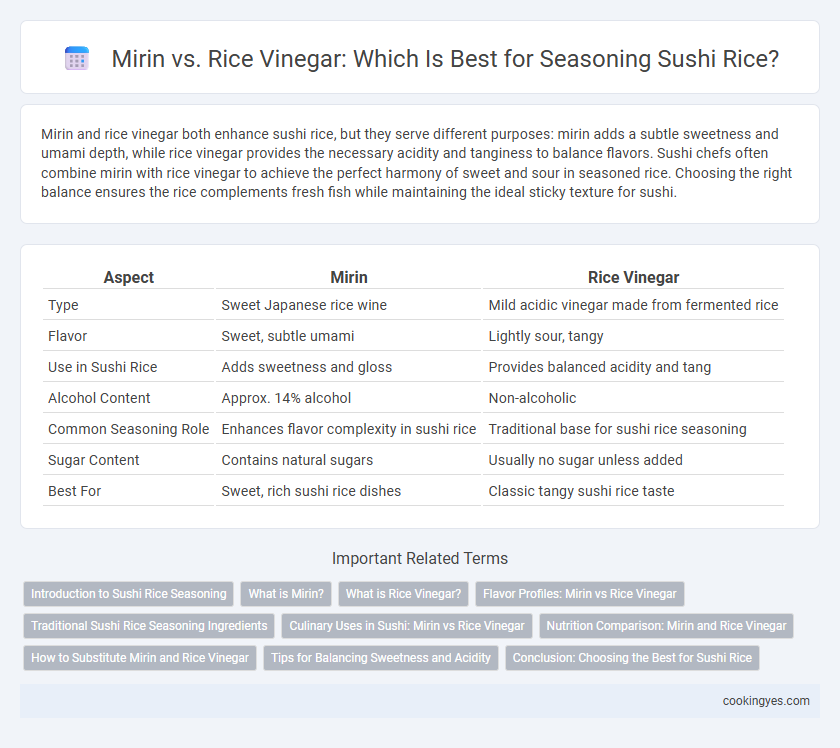Mirin and rice vinegar both enhance sushi rice, but they serve different purposes: mirin adds a subtle sweetness and umami depth, while rice vinegar provides the necessary acidity and tanginess to balance flavors. Sushi chefs often combine mirin with rice vinegar to achieve the perfect harmony of sweet and sour in seasoned rice. Choosing the right balance ensures the rice complements fresh fish while maintaining the ideal sticky texture for sushi.
Table of Comparison
| Aspect | Mirin | Rice Vinegar |
|---|---|---|
| Type | Sweet Japanese rice wine | Mild acidic vinegar made from fermented rice |
| Flavor | Sweet, subtle umami | Lightly sour, tangy |
| Use in Sushi Rice | Adds sweetness and gloss | Provides balanced acidity and tang |
| Alcohol Content | Approx. 14% alcohol | Non-alcoholic |
| Common Seasoning Role | Enhances flavor complexity in sushi rice | Traditional base for sushi rice seasoning |
| Sugar Content | Contains natural sugars | Usually no sugar unless added |
| Best For | Sweet, rich sushi rice dishes | Classic tangy sushi rice taste |
Introduction to Sushi Rice Seasoning
Mirin and rice vinegar play distinct roles in sushi rice seasoning, each contributing unique flavors and acidity levels essential for authentic taste. Mirin, a sweet rice wine, adds subtle sweetness and depth, while rice vinegar provides the critical tanginess that balances the rice's flavor. Combining these ingredients, along with sugar and salt, creates the perfect sushi rice seasoning that enhances the overall sushi experience.
What is Mirin?
Mirin is a sweet Japanese rice wine used primarily for seasoning sushi rice, adding a subtle sweetness and depth of flavor that enhances the overall taste profile. Unlike rice vinegar, which provides a sharp acidity to balance the rice, mirin contributes a gentle sweetness and slight umami, making it a key ingredient in traditional sushi rice seasoning. Its unique combination of sweetness and mild tanginess helps create the perfect balance essential for authentic sushi flavor.
What is Rice Vinegar?
Rice vinegar is a mild, slightly sweet vinegar made from fermented rice, commonly used in Japanese cuisine to season sushi rice. Its delicate flavor enhances the natural taste of the rice without overpowering the other sushi ingredients. Compared to mirin, which is a sweet rice wine, rice vinegar provides the essential acidity needed to balance the sweetness and texture of seasoned sushi rice.
Flavor Profiles: Mirin vs Rice Vinegar
Mirin provides a sweet, mild flavor with subtle umami notes that enhance sushi rice's richness, while rice vinegar offers a sharper, tangy acidity that balances the rice's natural sweetness. The choice between mirin and rice vinegar influences the overall sushi taste by either softening flavors with sweetness or adding brightness and a slight punch. Rice vinegar is traditionally preferred for its clean acidity, but combining mirin with vinegar can create a more complex seasoning profile.
Traditional Sushi Rice Seasoning Ingredients
Traditional sushi rice seasoning relies heavily on the balance between mirin and rice vinegar, each contributing unique flavors and properties. Mirin, a sweet rice wine with a lower acidity, adds subtle sweetness and gloss to the rice, while rice vinegar delivers the essential tartness and sharpness that defines authentic sushi rice. Combining these ingredients with sugar and salt creates the classic seasoning that enhances the texture and flavor profile of sushi rice.
Culinary Uses in Sushi: Mirin vs Rice Vinegar
Mirin, a sweet rice wine, enhances sushi rice with subtle sweetness and depth, balancing savory flavors and adding a glossy finish. Rice vinegar provides a sharp, tangy acidity crucial for the classic sushi rice seasoning, helping to preserve fish and highlight freshness. Combining mirin and rice vinegar achieves the ideal harmony of sweetness and acidity essential for authentic sushi rice flavor.
Nutrition Comparison: Mirin and Rice Vinegar
Mirin contains around 40-50 calories and 9-12 grams of sugar per tablespoon, providing a mild sweetness with trace amounts of alcohol, whereas rice vinegar is nearly calorie-free with negligible sugar, making it a lower-calorie option for seasoning sushi rice. Mirin also offers small amounts of carbohydrates and minimal sodium, while rice vinegar typically contains about 0-5 mg of sodium per tablespoon and contributes acidity without added sugars. Choosing between mirin and rice vinegar depends on whether a sweeter, richer flavor or a tangy, light seasoning is preferred, with rice vinegar being better for low-calorie, low-sugar diets.
How to Substitute Mirin and Rice Vinegar
Mirin can be substituted with a mixture of rice vinegar and sugar to replicate its sweet and tangy flavor in sushi rice seasoning. For every tablespoon of mirin, combine one tablespoon of rice vinegar with half a teaspoon of sugar for an effective replacement. When using rice vinegar alone to season sushi rice, adjust the quantity by slightly increasing sugar and salt to balance acidity and enhance flavor.
Tips for Balancing Sweetness and Acidity
Mirin provides a natural sweetness and mild acidity that enhances sushi rice without overpowering its delicate flavor, making it ideal for a balanced seasoning. Rice vinegar offers a sharper acidity that can brighten the rice but may require added sugar to achieve the desired sweetness, ensuring a harmonious taste profile. Balancing the proportions of mirin and rice vinegar allows for precise control over sweetness and acidity, crucial for authentic sushi rice seasoning.
Conclusion: Choosing the Best for Sushi Rice
Mirin and rice vinegar serve distinct roles in seasoning sushi rice, with mirin adding subtle sweetness and a mild glaze, while rice vinegar provides the essential tang and acidity that define authentic sushi rice flavor. Choosing rice vinegar is generally preferred for achieving the balanced, slightly sour profile crucial to traditional sushi taste and texture. For those seeking a touch of sweetness without compromising acidity, a combination of rice vinegar with a small amount of mirin can enhance complexity and authenticity in sushi rice seasoning.
Mirin vs Rice Vinegar for seasoning rice Infographic

 cookingyes.com
cookingyes.com